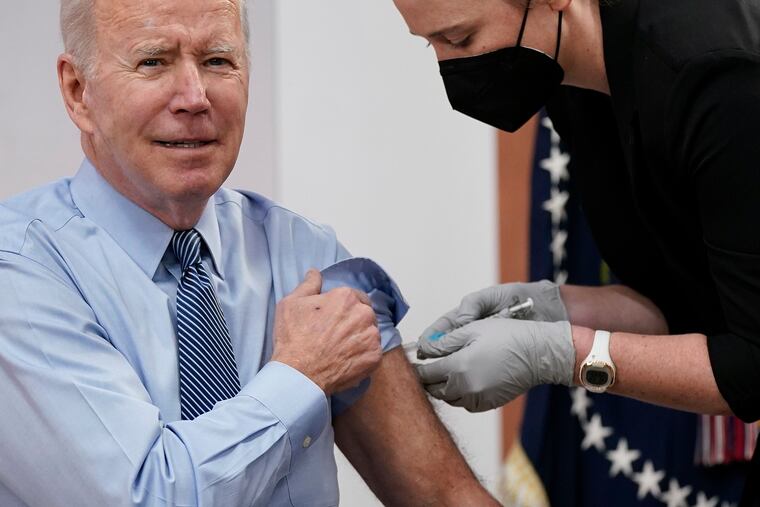I’m a physician over age 50 and I’m not getting my second COVID booster yet. Here’s why. | Opinion
I’m not opposed to the idea of a second booster shot against COVID-19 — I think it’s an important tool for public health. But the timing matters.

I’m a doctor and public health expert over the age of 50, in good health, and I’m not getting my second booster just yet.
I know this decision is surprising to some, given that the Food and Drug Administration (FDA) recently OK’d a second booster dose in my age group, as well as in those who are age 12 and older with certain conditions that compromise their immune systems. The Centers for Disease Control and Prevention (CDC) has also allowed second booster shots in people over 50 and those at risk of severe disease.
I’m not opposed to the idea of a second booster dose — I think it’s an important tool for public health. But for most older people with relatively healthy immune systems, I don’t think it’s time for a second booster.
“I’m not opposed to the idea of a second booster dose — I think it’s an important tool for public health.”
The argument in support of the second booster is rather straightforward: An additional shot will boost the waning immunity of individuals four or more months after their first booster, and thereby increase the effectiveness of the vaccine to protect against COVID-19 infection and subsequent disease.
For people whose immune systems don’t respond well to the COVID vaccine, or for those who have other conditions that make them more vulnerable to severe disease, this logic makes sense. But I don’t think it makes sense for all those over 50 who are not immunocompromised.
We are still learning about COVID and the best strategy to administer the vaccines. Our understanding about the benefits of second boosters comes from research in Israel, but that understanding is shifting constantly. And there are potential downsides to getting a booster now. For one, we don’t know how long the protection from this second booster dose will last. If we apply the experience with the first booster, protection from the second could wane in as little as three to four months, especially against the omicron variants, implying that we would need a third booster and who knows how many more afterward. We do not know what kind of protection we would get from a third or more booster doses, especially if they had the same formulation targeted at the original SARS-CoV-2 virus strain in the current vaccines.
» READ MORE: People 50 and older can soon get a second COVID-19 booster dose. But is it needed?
One argument for additional boosting now is to get ahead of a possible COVID surge due to a new variant. But the first booster shot appears to offer long-lasting protection against severe disease. Additional shots would make sense if we were experiencing a significant disease surge, in particular severe disease, resulting in rapidly increasing hospitalizations, ICU admissions, and mortality. Although cases are slowly rising in Pennsylvania and elsewhere with the increase in the BA.2 form of the omicron variant, I wouldn’t call it a “surge.”
Why is that important? Boosting immunity and vaccine effectiveness now, when we don’t particularly need it, may “waste” the benefit, leaving us with less immunity in any future surges. An imperfect analogy is the flu shot: Since the shot’s effectiveness peters out over time, the CDC recommends timing it to the start of flu season. (And the EU agrees with my assessment, recently saying it’s “too early” for second boosters for people with healthy immune systems under the age of 80.)
To decide when it’s time for me to get a second booster, I’m looking at the data. Research shows that people who have been vaccinated against COVID and who are relatively healthy would likely have significant protection from a second booster in about one to two weeks. I’m watching how the number of cases and hospitalizations during BA.2 creep up; if there is a significant, consistent surge, I will get my second booster and expect to be in good shape within several days. I will also be following ongoing FDA discussions for the appropriate vaccine strategy to prepare for a possible surge in the fall. In the meantime, I will continue to wear masks in dense, public settings, and take at-home COVID tests when appropriate. And as a public health physician, I will continue to encourage others to get vaccinated and to receive their first booster, if they are eligible.
Another consideration: Since the virus is evolving, manufacturers are working on variant-specific and universal COVID vaccines. I’m not sure how repeated boosters with the same vaccine strain could impact how well we respond to these future, tweaked versions of the vaccine.
The COVID vaccines are safe and effective and have undoubtedly saved millions of lives so far. I believe that boosters are important, and will continue to help save lives — but the timing matters.
Eddy Bresnitz is a physician and former deputy commissioner of the New Jersey Department of Health, where he was also the medical adviser to the COVID-19 Response Team.